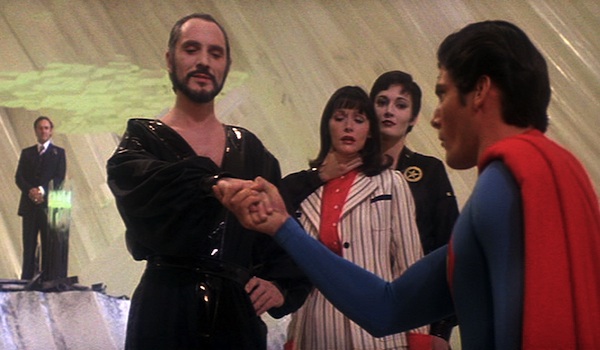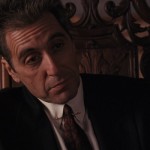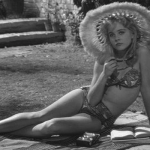Superman II Review
Posted on June 5, 2013 By John Gilpatrick 1980s, Classic Reviews, Movie Reviews
The behind-the-scenes story of Superman II is the stuff of legend, but one shouldn’t assume a project with such a messy history is itself a mess. On the contrary, Superman II (at least the theatrical version credited to director Richard Lester) is a slightly tighter, more suspenseful, and more entertaining film than its pretty terrific predecessor. It just took a hell of a winding road to get to the big screen.
Superman director Richard Donner had been tapped to film this sequel. In fact, he’d gotten about 75% of the way through shooting before he was abruptly fired by producers Alexander and Ilya Salkind. Unhappy with the darker tone Donner had been striving for, the Salkinds hired Lester (best known for The Beatles movie A Hard Day’s Night) to replace him. But because Donner had completed so much of the film, and because Lester would have needed to film at least 51% of the film himself to receive the sole director’s credit, whole sequences needed to be reshot, and other sequences needed to be added. Of course, suddenly firing a director is not without its consequences; Gene Hackman and Margot Kidder, among others, refused to film a scene for Lester out of protest. Alas, the film got completed (with Lester directing quite a deal more than 51% of it). It came out more than 18 months later than originally intended, but the wait was clearly worth it. The final product is simply great.
Where we last left our venerable Man of Steel (Christopher Reeve), he had just saved the world from Lex Luthor’s dasterdly plans and brought his love, Lois Lane (Kidder), back to life by reversing the rotation of the Earth. But the events of Superman II are more concerned with what happened at the beginning of its predecessor—the imprisonment and banishment of three criminals by Superman’s father, Jor-El, on the planet Krypton. General Zod (Terence Stamp) and his two henchmen, Ursa (Sarah Douglas) and Non (Jack O’Halloran), were caught plotting acts of treason and sedition against the planet and its leaders, so they were placed in something called a “phantom zone” and sentenced to aimlessly drift throught he universe for eternity.
But events on Earth lead to their release. Superman has to save Paris from a group of terrorits bent on detonating a hydrogen bomb at the Eiffel Tower. To do so, he grabs the bomb and flies it well above the atmosphere before sending it away. It denoates, and the shockwaves smash the phantom zone. Zod, Ursa, and Non find refuge on the moon, but Lex Luthor (Hackman) helps bring them to Earth. Three Supermen without a moral code? What could go wrong?
Quite a bit, it seems. They aren’t interested in helping Luthor. They’d rather enslave all of humanity and make Superman pay for his father’s actions against them. But Superman is gone. Forced to choose between being with Lois and keeping his powers, he becomes mortal just when mankind needs him the most.
Though the film runs a good 20 minutes shorter than its predecessor, it feels like there’s a lot more going on. Much of the action takes place outside Metropolis—like the aforementioned rescue in Paris and a character-building sequence between Clark and Lois at Niagra Falls. The choice Superman must make between love and duty feels old hat now because we’ve seen plenty of superheroes forced to make the same choice (most notably Spider-Man and Batman). It’s handled so well here, however, that you can almost feel how fresh the dilemma must have been back in 1980. While Superman doesn’t hesitate but a second, the reverberations of his decision are felt for days and around the world. As Zod takes over the Oval Office and forces the President of the United States to kneel before him in front of the whole world, we see men and women everywhere cry out for their hero who’s suddenly missing in action. And the looks on Clark’s and Lois’ faces are simply devastating as they realize the selfishness of their decision.
The film must also get credit for giving Superman a genuinely threatening troika of villains to spar with. Lex Luthor was a devious snake oil salesman in the first film, but he lacked a certain credibility for a number of reasons (not the least of which is because he literally invited Superman into his lair and told him everything about his evil plans when he could have easily gone ahead with them with Superman none the wiser, but I digress). Physically, he was no match for Superman, and his scheme ultimately doesn’t amount to much. Zod and company are poised to take over the world, and their collective powers are parallel to those of Superman, if not stronger. It’s hard not to feel a little more uncertain about how things will play out when you truly believe these three are capable of what they say and when Superman has never been less super.
You’ll see this film’s tone tilt a bit toward that of a slapstick comedy—a product of the change in the director’s chair. While this shift is nowhere near as big as the one that would occur between Superman II and Superman III, it does signal the beginning of the end of the series. As good as the big Metropolis battle is between Superman and his evil counterparts, it’s undone slightly by visual gags—a man in a toppling phone booth, an ice cream cone that blows away—that seem to serve no purpose other than to pull us out of the moment. It’s nothing like we’ll see in III, but if you’re looking for a flaw that holds this film back from being outstanding, you’ve found it.
Reeve and Kidder’s chemistry continues to shine; she’ll be sorely missed in the next outing. And Hackman seems to settled into a role he’s suited for—that of a slippery henchman. He’s always second fiddle to Zod in Superman II, but he’s never forgotten.
The special effects in Superman II aren’t a marked improvement over what you see in Superman, though there’s something charming about the simplicity of both films’ aesthetics. In a time when movie superheroes are CGI-ed to death, it’s nice to see a movie in which not everything is possible. The limitations placed on Donner and Lester allowed them to focus more on creating credible characters than jaw-dropping, flawless worlds. That’s what is most noteworthy about these two films and why they endure more than 30 years later.
1980, 3 Stars, Bob Paynter, Christopher Reeve, Clifton James, David Newman, E.G. Marshall, Gene Hackman, Geoffrey Unsworth, Jack O'Halloran, Jackie Cooper, John Barry, John Victor-Smith, Ken Thorne, Leslie Newman, Marc McClure, Margot Kidder, Mario Puzo, Richard Donner, Richard Lester, Sarah Douglas, Superman, Superman II, Susannah York, Terence Stamp, Tom Mankiewicz, Valerie Perrine

















2 Responses to Superman II Review